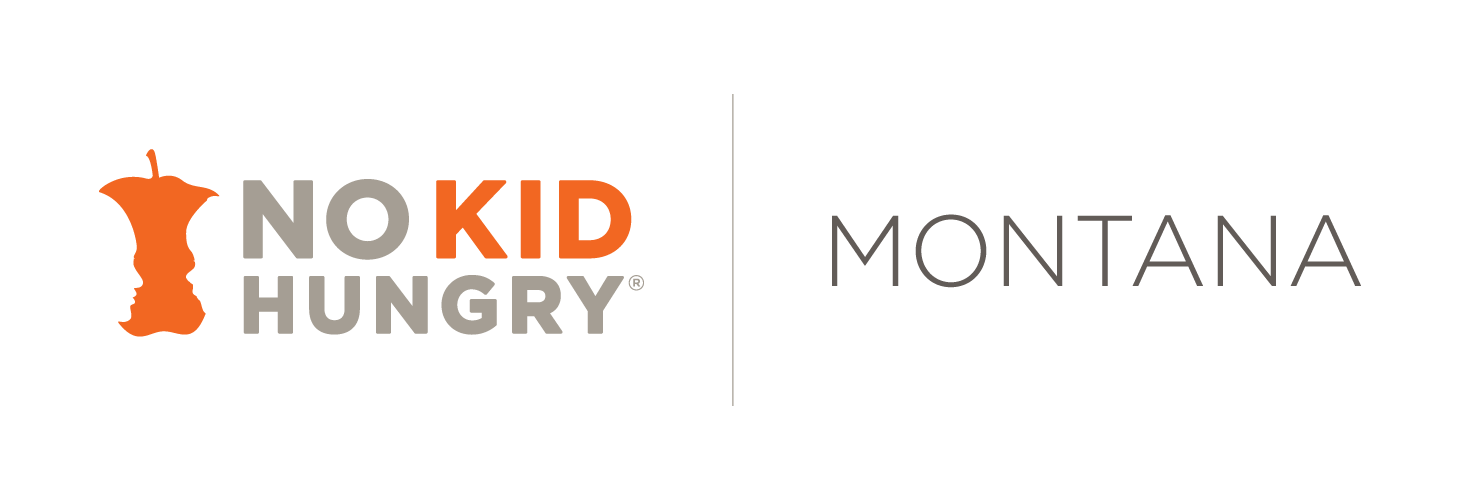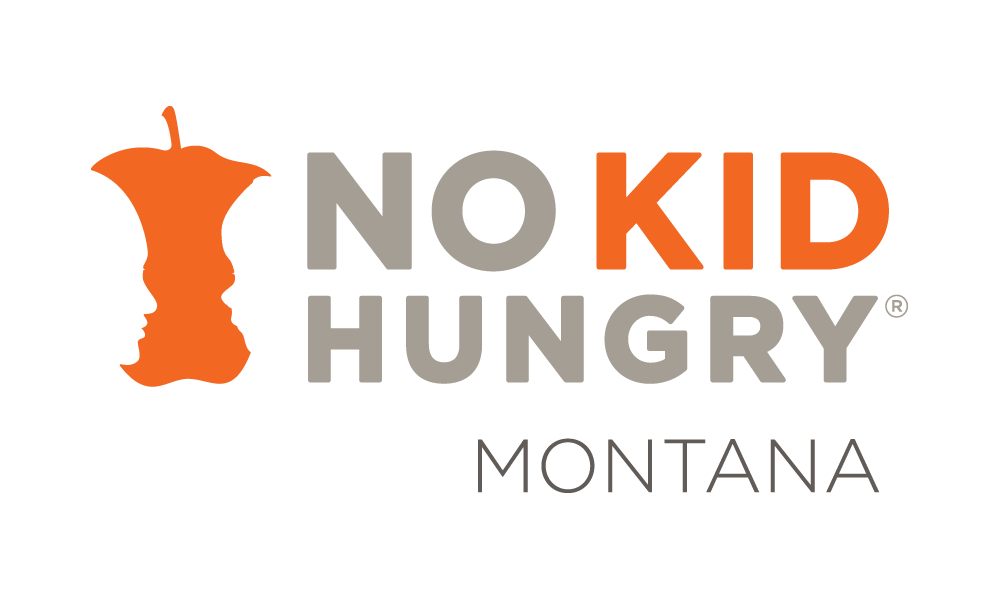
Article by Holly Michels at the Helena Independent Record
BROWNING — The sound of school bus horns carried on the wind through the neighborhoods in and around this small rural town on the eastern edge of Glacier National Park, a clarion call to the community’s children and families that breakfast was ready.
“I know they have kids here, I just gotta wake them up,” said Nicklo Crossguns between beeps as her school bus idled outside a home. “Come and get your breakfast!”
Crossguns, a school bus driver, was making her regular circuit Tuesday morning as the warming sun of a bluebird day barely made a dent in the deep snowdrifts along her route. Normally 80 kids, three to a seat, fill her bus. But this day it was all but empty, except two front seats — one carrying a box full of brown-bagged lunches and the other a crate of kid-size milk cartons.

Nicklo Crossguns delivers sack breakfasts to two young boys Tuesday morning when she could not drive her bus down their driveway without it getting stuck in the snow. THOM BRIDGE, Independent Record
On the second day into a minimum two-week school shutdown ordered by Montana Gov. Steve Bullock, an extraordinary measure meant to stave off as much as possible the spread of the coronavirus in the state, Crossguns turned from child-transporter to meal-deliverer, moving block to block watching small hands pull back window curtains and familiar faces peer outside at the sound of her yellow bus.
Districts around the state are adapting to feed the children who depend on their school for much more than an education. A waiver from the USDA allowed schools in the state to transition to their summer meal programs, offering grab-and-go options to keep students from gathering in a time of social distancing.
Stephanie Blackman, who normally cooks for children at Browning Elementary, knows well what a meal can mean to her students.

School cook Stephanie Blackman inventories the refrigerator at Browning Elementary School on Tuesday morning. Blackman says the school is well supplied with food to distribute while school is closed for the foreseeable future. THOM BRIDGE, Independent Record
“What I keep in my mind is a child who came in once and said, ‘I’m so glad it’s Monday. I didn’t eat all weekend,’” Blackman said.
Browning Public Schools are keeping children fed and providing certainty in an unsettled time through a volunteer force of school employees on leave from their jobs, like Crossguns and Blackman, and community members who are ready to work as long as needed to get meals to kids.
Blackman filled brown paper sacks with warm soft pretzels, cheese, hard-boiled eggs and bananas in the empty school cafeteria, a radio pumping out upbeat music as she worked in the dark because the door to where the light switch is located was locked.
Finding volunteers has been a bit of a challenge as families adapt to children being out of school and try to follow social-distancing guidelines, but that didn’t deter Blackman and her crew.
“We’ll get it done,” she said.
By 8:30 a.m. they’d made 300 breakfasts, then turned around to put together another 300 lunches for the students who would normally be filling the seats at the long lunch tables Blackman converted to a work station.

Laura Hall, left, and Ashley Blackman bag 300 sack breakfasts Tuesday morning at Browning Elementary School in Browning, Montana. THOM BRIDGE, Independent Record
The process is not new for Blackman, who honed this skill during the 2019 blizzard that covered Browning in 4 feet of snow.
“We’ve served a lot of sack lunches and we’ve made a lot,” she said.
Volunteer Laura Hall, who also works at the school, said the community has come together before and knows how to take care of each other.
“In my experience we’ve always been having each other’s backs,” Hall said. “When you deal with a crisis, you help each other. It’s natural. Our kids are going to be fed and we’re going to feed them.”
This time, though, a pump bottle of hand sanitizer placed prominent at the end of the lunch table hammered home the message that dealing with a pandemic feels a little different.
Across the street at Napi Elementary, Philip Sure Chief was 200 ham-and-cheese sandwiches through the 500 he needed to assemble.

Philip Sure Chief prepares hundreds of sandwiches Tuesday morning at Napi Elementary School in Browning, Montana. THOM BRIDGE, Independent Record
Sure Chief knows firsthand kids are struggling to navigate an uprooted schedule.
“They’re already bored out of their minds,” he said of his own children, ages 14, 10 and 6. His oldest, a freshman in high school, was looking forward to a track season that might not happen. It’s hard to explain to the youngest why visits with friends are off the table, while his middle daughter has been FaceTiming her friends.
***
It took just shy of an hour for Crossguns to distribute her 30 meals, including the 7-mile drive to Starr School.
“We took routes yesterday that we know and it worked well. We know where the kids are,” Crossguns said. “We’re pioneering it. Yesterday I had kids saying, ‘My bus driver’s here!’ They were all happy.”
Students and their families found out about the program through a mix of posts on Facebook, the Browning Public Schools’ website and the benefit of living in a small town where everybody knows everybody. Throw in Crossguns’ cheerful honking and one boisterous pup who howled along, and people got the word.
Cherie Bear Medicine came at the sound of the bus to collect meals for her four grandchildren. She heard about the deliveries on Facebook.

Nicklo Crossguns, left, laughs with Cherie Bear Medicine Tuesday morning on her route distributing sack breakfasts to residences outside Browning. Bear Medicine is a grandmother of four who is watching the children during the school shutdown due to coronavirus. THOM BRIDGE, Independent Record
“I appreciate it, it helps a lot,” Bear Medicine said. She’s trying to keep her grandchildren occupied while following social distancing recommendations. “We just go with the flow.”
A photo of one of Crossguns’ daughters, a senior in high school, hangs above the windshield visor on the bus. The daughter was on the basketball team and played in the state tournament in Billings until it was canceled just before the finals.
Though Browning was playing for third place, Crossguns said her daughter “still thought she’d get one more game.”
***
Generally, people in Browning, which doesn’t have a diagnosed COVID-19 case yet as Montana announced more cases within the state’s borders Wednesday, are taking the precautions seriously. Like other communities around Montana, the Blackfeet Tribe issued orders closing bars, following recommendations from the Centers for Disease Control and Prevention about limiting gatherings of people, and urged restaurants to move to take-out or delivery only. The tribe also authorized leave for its employees to be able to adapt to students out of school and put into place a curfew, among other measures to prevent spread when the virus is assumed to arrive in this remote town.

School cooks and volunteers bag 500 breakfasts and lunches Tuesday morning at Napi Elementary School in Browning, Montana. THOM BRIDGE, Independent Record
Some think that might not happen until the summer, when people generally flock to this part of the world in awe of the Rocky Mountain Front and Glacier National Park.
“I think now we’re pretty isolated, but come summertime we’re not,” Sure Chief said. “It’ll probably get here through tourists.”
Still, people are being cautious. Anyone who was at the state high school basketball tournament in Billings wasn’t allowed to help package lunches. The senior meal program, which encouraged congregating, moved to grab-and-go options and home delivery. Also, on Bullock’s order, the nursing home was closed to visitors.

As a safety measure, administrators with the Blackfeet Community Hospital have closed this entrance to direct people through the emergency entrance where they are screened for coronavirus before entering the facility. THOM BRIDGE, Independent Record
All but one entrance at the Blackfeet Community Hospital was closed to the public Tuesday. Employees screened anyone entering for symptoms and asked about their travel history. Hospital employees and administrators were not allowed to talk to reporters without permission from Indian Health Service’s headquarters.
James McNeely, the public information officer for the Blackfeet Tribe, said the tribe is confident in the hospital’s ability to respond to the community’s needs. Administrators have been working with the tribal and Glacier County officials to implement a disaster preparedness plan.
“We’re going to get through it as a tribe, as a community, as a nation, as a human race, because we all have to work together,” McNeely said.





